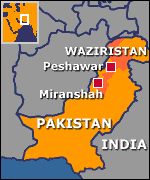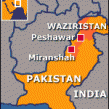
MILITANTS IN NORTHERN PAKISTAN ALLEGEDLY INCLUDE KAZAKH NATIONALS
Publication: Eurasia Daily Monitor Volume: 2 Issue: 144
By:

Kazakhstan’s security services have repeatedly resorted to the tactic of denying offhand any possible connections between Kazakh nationals and international extremist organizations. This tested rule of the game worked well after terrorists seized a school in Beslan, North Ossetia, last September and after the terrorist bombings in Uzbekistan in March and April 2004.
Responding harshly to Uzbek accusations of sheltering terrorists, the National Security Committee of Kazakhstan, in a rather convincing manner, said that Kazakhstan had no terrorist training camps on its soil. However, the July17 clash between Pakistani troops and militant extremists in the town of Miranshah in the North Waziristan province of Pakistan shattered this self-complacency.
Pakistani sources reported that four extremists killed during the nighttime shootout between government troops and armed extremists in Miranshah, near the Afghan border, carried Kazakh passports. Pakistani military authorities said that seized diaries and notes, as well as the passports, clearly indicate that some of the 19 militants killed by soldiers were Kazakh nationals. But the Foreign Ministry of Kazakhstan neither denied nor confirmed this report. The Embassy of Kazakhstan in Islamabad refused to comment on the incident, saying that the information provide by Pakistani side was sketchy and insufficient, while a Pakistani military official, Shaukat Sultan, told the AFP news agency that at least four of the killed were Kazakh citizens, and that the other foreigners were from other Central Asian states (Ekspress-K, July19).
Whatever arguments the Foreign Ministry of Kazakhstan may offer to the contrary, the inability of Kazakhstan’s security services to prevent homegrown extremists from establishing links with terrorist networks in Afghanistan and Pakistan is apparent. More than that, Kazakhstan, contrary to illusory invulnerability to outside destabilizing forces, found itself totally unprotected against the extremist threat from its neighbors after the Andijan events in Uzbekistan and upheavals in Kyrgyzstan.
In its erroneous belief that the CIS Collective Security Treaty Organization and the Shanghai Cooperation Organization would provide the best protection from terrorist and extremist incursions, Astana shortsightedly joined other SCO members in demanding that Washington set a precise timetable for the withdrawal its military bases from Central Asia. This seemingly bold step and the need to tighten security cooperation with its SCO partners forces Kazakhstan to share some of Moscow’s and Beijing’s policies toward Taiwan and Chechnya, the perilous path likely to lead Kazakhstan into new tangles of confrontation. In fact, the American withdrawal from Central Asia will give rise to religious extremism in the region rather than averting the threat of terrorism. By giving priority to security cooperation with SCO states, Kazakhstan has wandered off its rational policy of building equally balanced relationship with the United States, Russia, and China (Delovaya nedelya, July 22).
It is becoming evident that Kazakh security forces will not be able to control effectively the security situation without addressing the root causes of religious extremism. The underlying principles of traditional Islam are being distorted, and sectarianism is gaining ground among Kazakhstan’s Muslims. Deputy Chief of the National Security Committee of Kazakhstan Nartay Dutbayev first identified this dangerous trend among Kazakh believers in September 2004.
In reality, little, if anything, has been done to minimize the illegal activities of missionaries from Turkey and Pakistan, who often preach intolerance to their disciples. One of the zealots of the extremist brand of Islam is Ismatulla Maksum, a Pakistani citizen educated at Peshawar University who was deported from Kazakhstan to his home country in 1999 for teaching extremism, only to reappear in Kazakhstan earlier this year. Kazakh authorities still prefer to close their eyes to extremist calls from foreign missionaries (Zhas Alash, April 9).
At best, the security services stage sporadic detentions and show trials of some suspected Islamic activists caught distributing extremist literature in various cities of Kazakhstan. However, no data is available concerning how many Kazakh citizens have been recruited by Islamic extremists in Afghanistan or Pakistan. Not surprisingly, in connection with the incident in Miranshah, the press attaché of the Embassy of Kazakhstan in Islamabad, Yernur Tuyakbayev, said that the Embassy could not get any information concerning the identity of the alleged Kazakh citizens killed by the Pakistani soldiers (Izvestiya Kazakhstan, July 21).
The National Security Committee of Kazakhstan did not release any comments on the possible involvement of Kazakh nationals in clashes with Pakistani soldiers or about where they received their military training. It should be noted however, that a month ago the deputy chief of the National Security Committee, Vladimir Bozhko, admitted that terrorists were trying to set up a training camp in Kazakhstan and some of the perpetrators of bomb attacks in Uzbekistan last year had been trained in Kazakhstan (Kazakhstanskaya pravda, June 18). The involvement of Kazakh citizens in militant attacks in Miranshah provides more proof of the fact that religious extremism is merging with international terrorist organizations operating in Kazakhstan. That dangerous development is something security authorities are increasingly finding hard to deny.




